UHAI is Africa’s first indigenous activist led and managed fund for and by sex workers and sexual and gender minorities.
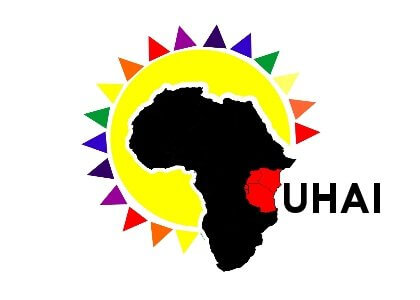
UHAI is Africa’s first indigenous activist led and managed fund for and by sex workers and sexual and gender minorities. UHAI believes in African activists’ voice in resourcing the struggle for equality, justice and dignity for Africa’s sex workers and sexual and gender minorities. UHAI is changing the narrative of how Africa’s human rights and health struggles are resourced from one of ‘foreign assistance’ to one of ownership and self-determination by the very activists who live the struggles. UHAI supports civil society organising for and by sex workers and sexual and gender minorities in Burundi, the Democratic Republic of Congo, Ethiopia, Kenya, Rwanda, Tanzania and Uganda with flexible and accessible grants; capacity support; support for Pan-African advocacy and organising (including support for activist-led convening); and research and documentation. Over the last 7 years, UHAI has made US$6 million in grants to Eastern Africa’s sex workers and sexual and gender minorities. Eastern African activists themselves determine most of these grants. UHAI has provided multi-year capacity support to more than 50 community organisations; supported numerous Pan-African advocacy engagements and convening; and contributed to the repertoire of knowledge on Eastern Africa LGBTI and sex worker human rights and health. UHAI just concluded a landscape analysis of the context in which Eastern Africa’s trans, intersex and gender non-conforming communities organise and exist. The analysis shares information on five thematic focus areas: legal environment, public discourse, health, lived realities and organising landscape.
Founded in 2007, the Grupo Latinoamericano de Estudio, Formación y Acción Feminista (GLEFAS) is a leading regional group that is initiating important dialogues, conversations, and political actions within the feminist and lesbian feminist movement.
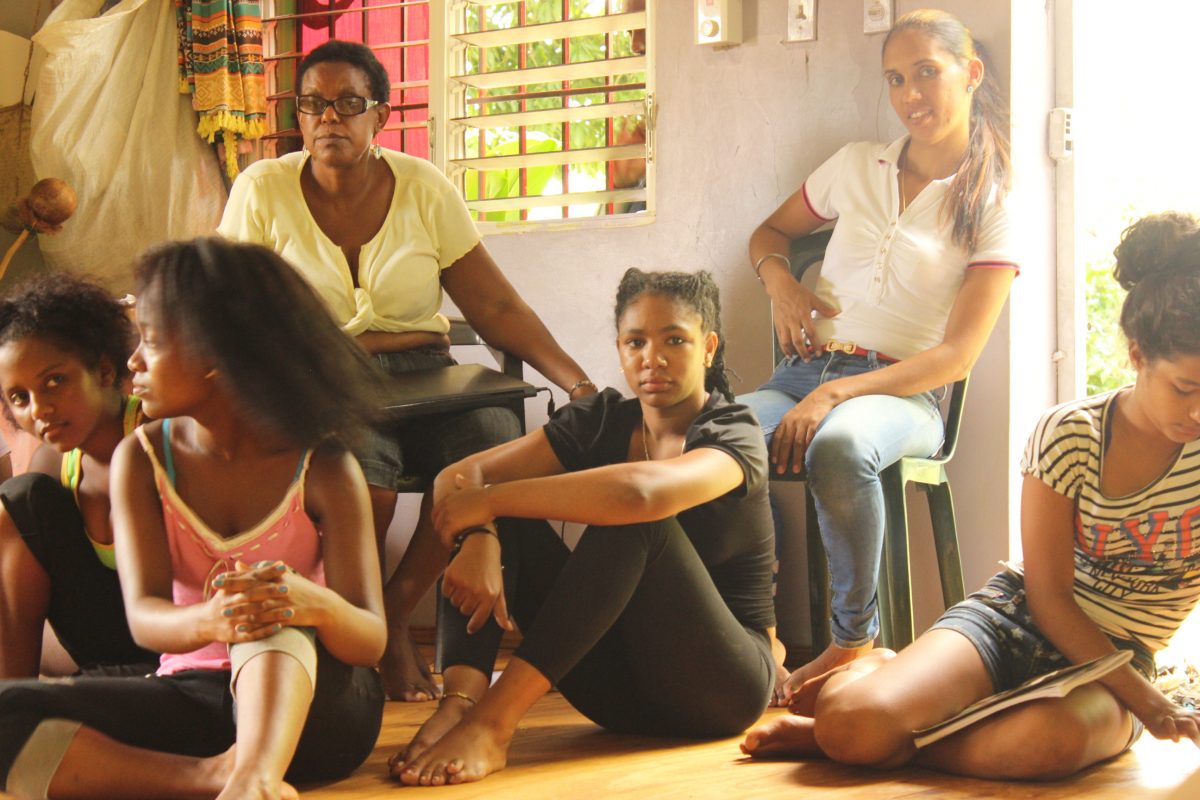
Founded in 2007, the Grupo Latinoamericano de Estudio, Formación y Acción Feminista (GLEFAS) is a leading regional group that is initiating important dialogues, conversations, and political actions within the feminist and lesbian feminist movement in Latin América and the Caribbean, as well as other social movements and land struggles in the region, looking to join efforts for more comprehensive policies to confront different forms of oppression. As Caribbean and Latin American anti-racist and decolonial feminists, one of their goals is to produce autonomous knowledge from their own positioning as black, indigenous, and lesbian activists from the South. They collaborate with non-white and mixed-race women (or women of color, as it is commonly used in the United States) who are committed to intersectional politics and views in Argentina, Colombia, Guatemala, Honduras, Costa Rica, Peru, Dominican Republic, Mexico, Ecuador, Brazil, the United States, and Europe. In response to the regional context of war, militarization, and violence, GLEFAS seeks to produce a political analysis from an anti-racist, anti-military, anti-colonial, anti-capitalist, feminist lesbian perspective. GLEFAS seeks to support the creation of collectives in different countries of the region. *** En Español*** Fundado en 2007, el Grupo Latinoamericano de Estudio, Formación y Acción Feminista (GLEFAS) es un grupo regional líder que está iniciando importantes diálogos, conversaciones y acciones políticas dentro del movimiento feminista y lésbico feminista de América Latina y el Caribe, así como con otros movimientos sociales y de luchas territoriales en la región en la búsqueda de aunar esfuerzos para políticas más integrales que impliquen enfrentar diferentes formas de la opresión. Una de sus metas como feministas antirracistas y descoloniales latinoamericanas y caribeñas es producir un conocimiento autónomo desde sus propios posicionamientos como activistas lesbianas, indígenas y negras del sur. Colaboran con mujeres no blancas y mestizas comprometidas con una mirada y una política interseccional (o de color, como se dice comúnmente en Estados Unidos) en Argentina, Colombia, Guatemala, Honduras, Costa Rica, Perú, República Dominicana, México, Ecuador, Brasil, Estados Unidos y Europa. En respuesta al contexto regional de guerra, militarización y violencia, GLEFAS busca producir un análisis político desde una perspectiva feminista y lésbica antirracista, antimilitarista, anticolonial y anticapitalista. GLEFAS busca apoyar la formación de colectivos en diferentes países en la región.
Founded in 2005, Lesbian Independent, Feminist and Socialist Lesbian (LIFS) has been a grantee partner of Astraea since 2008.
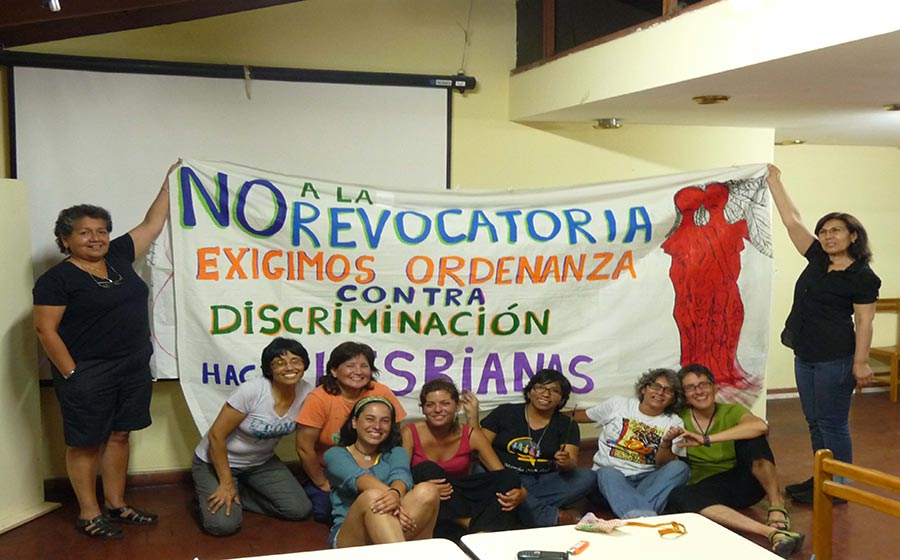
Founded in 2005, Lesbian Independent, Feminist and Socialist Lesbian (LIFS) has been a grantee partner of Astraea since 2008. LIFS is one of the oldest lesbian organizations in Peru. It is well-known and well-connected with the Peruvian feminist movement and over the years has created a voice in policy advocacy spaces such as the Ministry of Women. It believes that policy changes have to be accompanied by feminist transformations and, to this end, it organizes forums with young lesbians to provide feminist political education, works in coalition with LGBT and non-LGBT organizations, and one of its primary goals is to create networks. It also has a well-known “Batukada Lesbian Feminist Voices Les,” which is a type of grassroots political protest in the Latin American and Caribbean region, in which members go out to rallies and protests with drums and sing popular songs that are adapted to convey political messages. *** En Español*** Fundada en 2005, Lesbianas Independientes, Socialistas y Feministas (LIFS) ha sido co-parte de Astraea desde 2008. LISF es una de las organizaciones lésbicas más antiguas de Perú. Es bien conocida y está bien conectada con el movimiento feminista peruano y a través de los años ha creado a una voz en espacios de defensoría de políticas como el Ministerio de la Mujer. Cree que los cambios de políticas tienen que estar acompañados por transformaciones feministas y, para este fin, organiza foros con lesbianas jóvenes para brindar educación política feminista, trabaja en coalición con organizaciones LGBT y no LGBT, y una de sus metas primordiales es crear redes. También tiene una muy conocida “Batukada Lésbica Feminista Voces Les”, la cual es un tipo de protesta política de base en la región de Latinoamérica y el Caribe, en la cual las personas miembro salen a mítines y protestas con tambores y cantan canciones populares con líricas adaptadas para transmitir mensajes políticos.
Colectivo Sentimos Diverso is a feminist group that mobilizes to create and develop projects and actions that empower women, adolescents, young people and people with sexual orientations and diverse gender identities for the enforceability of human, sexual and reproductive rights.
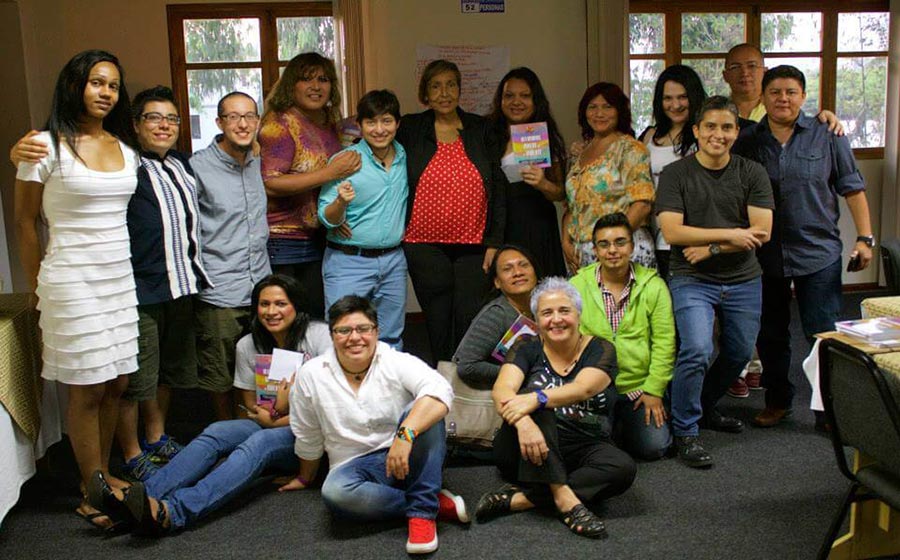
Colectivo Sentimos Diverso is a feminist group that mobilizes to create and develop projects and actions that empower women, adolescents, young people and people with sexual orientations and diverse gender identities for the enforceability of human, sexual and reproductive rights. They seek to build a more just, inclusive and violence-free world. They started their work in 2006 in the city of Bogotá. Since 2011, they have moved to the city of Quito, Ecuador, where they have focused on developing three lines of action:
- Pedagogical
- Communication and Networks
- Research and creation
In September of 2015, the Ecuadorian government recognized their foundation status. Their local work is recognized and strengthened by their visibility and impact at the regional level. They are part of the Campaign for the Inter-American Convention on Sexual Rights and Reproductive Rights and the Southern Transfusionist Network (in development).
*** En Español***
Somos un colectivo feminista que se moviliza para crear y desarrollar proyectos y acciones que empoderen a mujeres, adolescentes, jóvenes, y personas con orientaciones sexuales e identidades de género diversas para la exigibilidad de los derechos humanos, sexuales y reproductivos. Buscamos construir un mundo más justo, incluyente y libre de violencias.
Iniciamos nuestro trabajo en el año 2006 en la ciudad de Bogotá. Desde el año 2011 nos trasladamos a la ciudad de Quito, Ecuador, en dónde nos hemos centrado en desarrollar tres líneas de acción:
- Pedagógica
- Comunicación y redes y
- Investigación y creación.
En septiembre de 2015 el gobierno ecuatoriano reconoció nuestra personería jurídica, bajo la forma de Fundación.
Nuestro trabajo local es reconocido y fortalecido por nuestra visibilidad e incidencia a nivel regional. Hacemos parte de la Campaña por la Convención Interamericana de Derechos Sexuales y Derechos Reproductivos y la Red Transfeministas del Sur (en desarrollo).
Based in Quito, Taller de Comunicación Mujer (TCM) is a women’s rights organization that works to advance the human rights of lesbian and bisexual women.
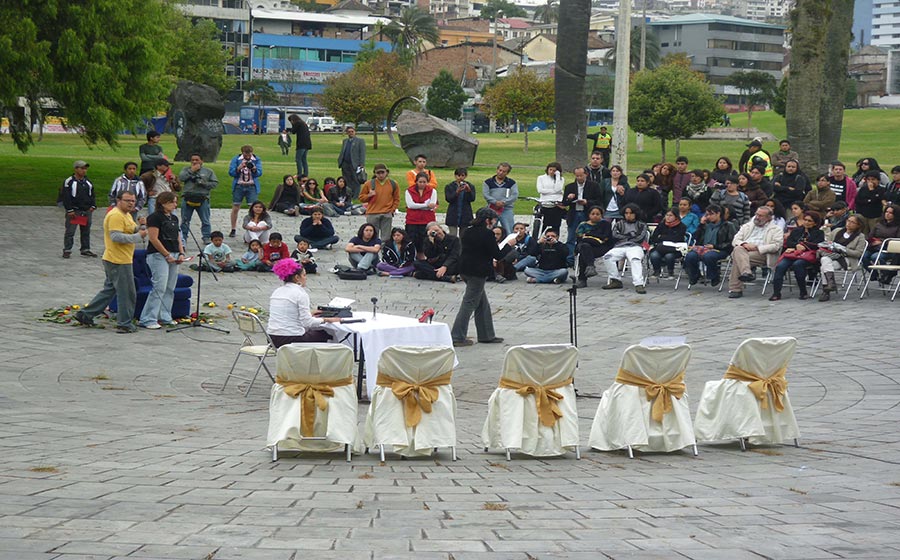
Based in Quito, Taller de Comunicación Mujer (TCM) is a women’s rights organization that works to advance the human rights of lesbian and bisexual women. TC Women documents and monitors the “de-homosexualization clinics” and human rights violations within them. In 2011, TC Mujer was responsible for ensuring that CETFDCM (the CEDAW) and the Human Rights Council recommended and monitored the closure of all clinics by the Ecuadorian state. TC Women has helped close many of these clinics. TC Mulher continues to document and monitor clinics in four provinces (Guayaquil, Manabí, Pichincha and Azuay), documenting survivors’ testimony and monitoring the Ministry of Health, while pursuing a broader feminist advocacy for women’s sexual and reproductive rights. *** En Español*** Con base en Quito, el Taller de Comunicación Mujer (TC Mujer) es una organización de derechos de las mujeres que trabaja por el avance de los derechos humanos de las mujeres lesbianas y bisexuales. TC Mujer documenta y monitorea las “clínicas de deshomosexualización” y las violaciones de derechos humanos dentro de estas. En 2011, TC Mujer fue responsable por lograr que la CETFDCM (también conocida como CEDAW, por sus siglas en inglés) y el Consejo de los Derechos Humanos recomendaran y monitorearan el cierre de todas las clínicas por el estado ecuatoriano. TC Mujer ha ayudado a cerrar muchas de estas clínicas. TC Mujer continúa documentando y monitoreando clínicas en cuatro provincias (Guayaquil, Manabí, Pichincha y Azuay), documentando testimonios de sobrevivientes y monitoreando al Ministerio de Salud, a la vez que realiza una abogacía feminista más amplia por los derechos sexuales y reproductivos de las mujeres.
Causana has carried out awareness raising on LGBT realities with hundreds of public servers in the judicial and health sectors, targeting mainly health providers, police and prosecutors.
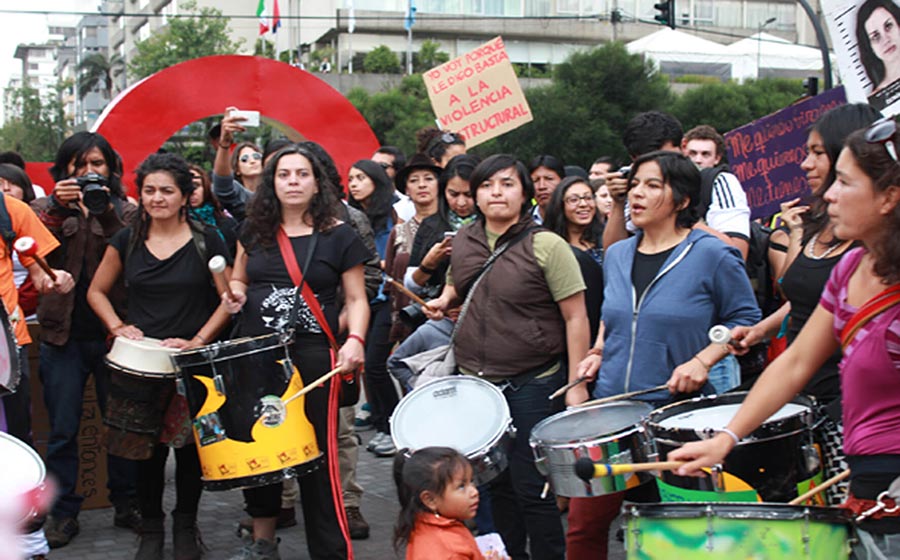
Founded in 2003, Causana is a lesbian feminist collective located in Quito that has fought for the closure of “dehomosexualization clinics” for several years. It also provides legal and psychological support to lesbian survivors of these clinics. Causana has carried out awareness raising on LGBT realities with hundreds of public servers in the judicial and health sectors, targeting mainly health providers, police and prosecutors; it has also done so with various sectors of society: older adults, teachers, students, families, youth sectors, public servers, etc. Through community mobilization and six National Lesbian Encounters as well as training processes and public actions to raise awareness and denounce, Causana has strengthened the capacity of LBT women to demand their rights and access a life of freedom. Causana’s mission is to de-structure the systems of power and subordination through the empowerment and empowerment of LBT people from an inclusive approach of genres, diversities and holism to develop a new community co-existence proposal within a framework of harmony with others. *** En Español*** Fundada en 2003, Causana es una colectiva lésbica feminista ubicada en Quito que se destaca por su lucha contra los encierros en las llamadas “clínicas de deshomosexualización” desde hace varios años. También ofrece apoyo legal y psicológico a sobrevivientes lesbianas de estas clínicas. Causana ha realizado capacitaciones de sensibilización sobre las realidades LGBT con cientos de servidorxs públicxs en los sectores judicial y de salud, dirigiéndose principalmente a lxs proveedorxs de salud, la policía y la Fiscalia; de igual manera lo ha hecho con diversos sectores de la sociedad: adultxs mayores, docentes, estudiantes, familias, sectores juveniles, servidorxs públicxs, etc. Mediante la movilizacion comunitaria y seis Encuentros Nacionales Lesbicos así como procesos de capacitación y acciones públicas de visibilización y denuncia, Causana ha fortalecido la capacidad de las mujeres LBT para exigir sus derechos y acceder a una vida de libertades. La misión de Causana es desestructurar los sistemas de poder y subordinación a través del empoderamiento y fortalecimiento de las personas LBT desde un enfoque inclusivo de géneros, diversidades y holismo para desarrollar una nueva propuesta de convivencia comunitaria en un marco de armonía con nostrxs, lxs otrxs y la Pacha Mama.
Gender DynamiX is a long-standing national and regional advocacy organization by and for trans people.
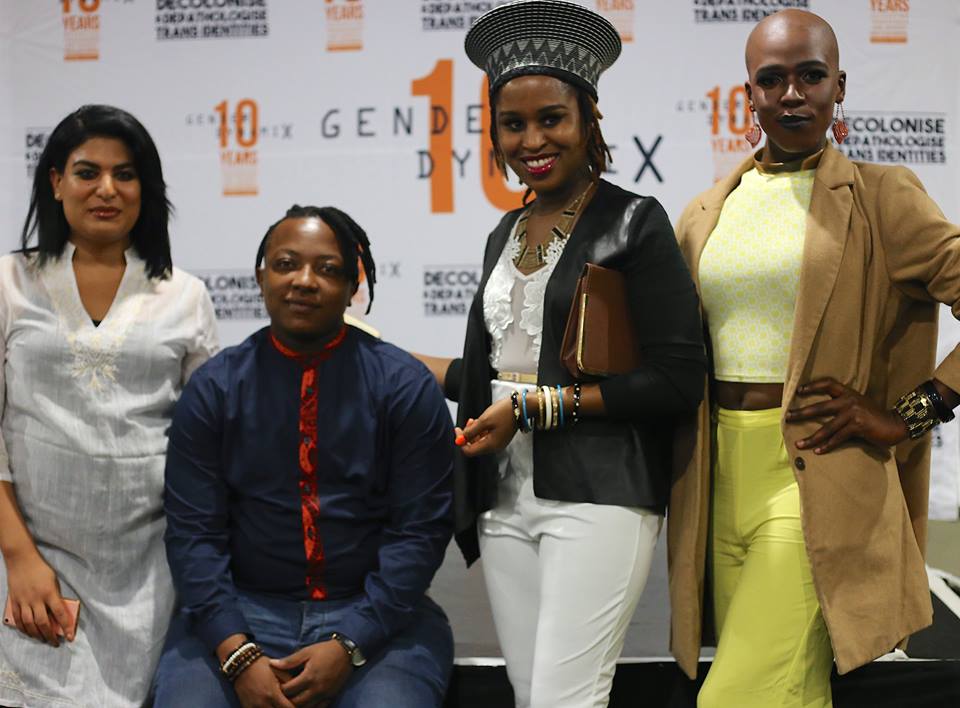
Gender DynamiX is a long-standing national and regional advocacy organization by and for trans people. Gender DynamiX’ long term goal is to ensure that diverse trans and intersex people are able to live openly, without obstruction, and in dignity by being able to equitably participate in the social, political and economic spheres of society. Over the last four years, they have engaged in advocacy campaigns to enforce Act 49 (the existing legal gender recognition law), increase access to healthcare, education, and accountability for violence against trans communities. They now have an opportunity to refocus efforts on redrafting South Africa’s gender recognition law to fully incorporate fundamental human rights for diverse trans people, which includes the right to self-identification premised on one’s right to self-determination, dignity and freedom. Over the next two years, they will build up a self-identification discourse, consolidate support amongst human rights movements, develop self-identification jurisprudence through test litigation cases and build a solid network of political and social stakeholders invested in legislative change.
Cattrachas is a collective of psychologists, advocates, academics, media communicators, graduate students, and activists whose main goal is to advance and protect the human rights of LGBTQI people in Honduras.
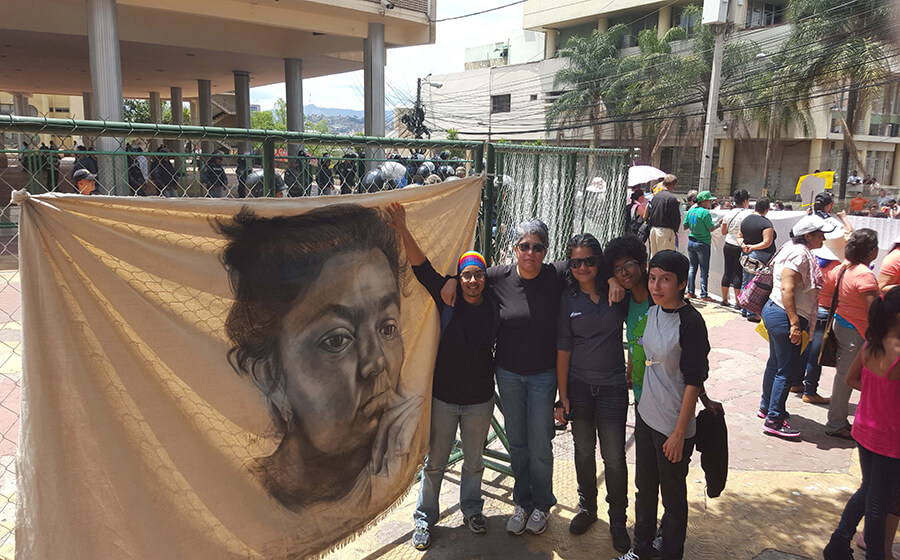
Cattrachas is a collective of psychologists, advocates, academics, media communicators, graduate students, and activists whose main goal is to advance and protect the human rights of LGBTQI people in Honduras through rigorous documentation of cases of violence against people LGBTQI, national and international advocacy at the policy level, and the creation and use of networks at local, regional and international levels. Thanks to its strategic advocacy, articles 27, 117, and 321 of the Honduran Penal Code have been reformed. These articles now penalize hate crimes against LGBTI people and femicides. Its leadership in investigating and documenting human rights violations against LGBTQI people has been instrumental in getting other co-parties in Latin America to also systematically monitor and document violence against LGBT people. Watch Cattrachas Founder Indyra Mendoza’s speech at our 40th Anniversary Gala in November 2017: *** En Español*** Cattrachas es un colectivo de psicólogxs, abogadxs, integrantes de la academia, comunicadorxs mediáticxs, estudiantes graduadxs y activistas cuyo objetivo principal es avanzar y proteger los derechos humanos de las personas LGBTQI en Honduras a través de la documentación rigurosa de casos de violencia contra las personas LGBTQI, la defensoría nacional e internacional a nivel de políticas y la creación y el uso de redes a niveles local, regional e internacional. Gracias a su defensoría estratégica, los artículos 27, 117 y 321 del Código Penal hondureño han sido reformados. Estos artículos ahora penalizan los crímenes de odio contra las personas LGBTI y los feminicidios. Su liderazgo en la investigación y la documentación de las violaciones de los derechos humanos LGBTQI ha sido fundamental para lograr que otras co-partes en América Latina también monitoreen y documenten de forma sistemática la violencia hacia las personas LGBT. Mira el discurso del fundador de Cattrachas en nuestra gala de 40 aniversario en noviembre de 2017 aquí:
SASOD is dedicated to the eradication of homophobia in Guyana and throughout the Caribbean. Since 2003 they have been working tirelessly to repeal discriminatory Guyanese laws, change local attitudes about the LGBT community, advocate for human rights, and end discrimination in the government, workplace, and community.
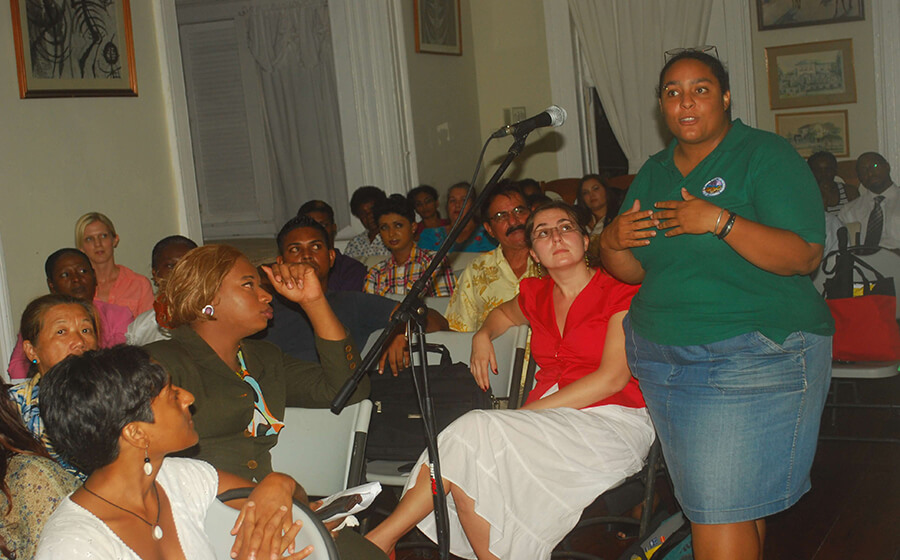
SASOD is dedicated to the eradication of homophobia in Guyana and throughout the Caribbean. Since 2003 they have been working tirelessly to repeal discriminatory Guyanese laws, change local attitudes about the LGBT community, advocate for human rights, and end discrimination in the government, workplace, and community. Four years ago SASOD and four claimants launched a suit against the 1893 law against male and female “cross-dressing.” In 2013, the Guyana Chief Justice unfortunately did not declare the “cross-dressing law” unconstitutional, stating that the law isn’t discriminatory on the basis of gender because it applies to both men and women. SASOD has submitted an appeal in the hopes the case will be ruled in their favor. In the meantime, SASOD continues to monitor the case, train media outlets on LGBT discrimination, work with trans organizations to develop security protocols, and engage in international advocacy. They aim to pass an amendment to the Prevention of Discrimination Act 1997 to include SOGI and health status as grounds for protection. SASOD recently leveraged Guyana’s 2nd UPR review in January 2015 with a successful media campaign, obtaining coverage on LGBT issues from nearly every media outlet.
Founded in 2004, Colombia Diversa works for the equal inclusion of LGBT people in Colombia through legal advocacy, documentation of human rights violations, advocacy on national and international public policies and visibility.
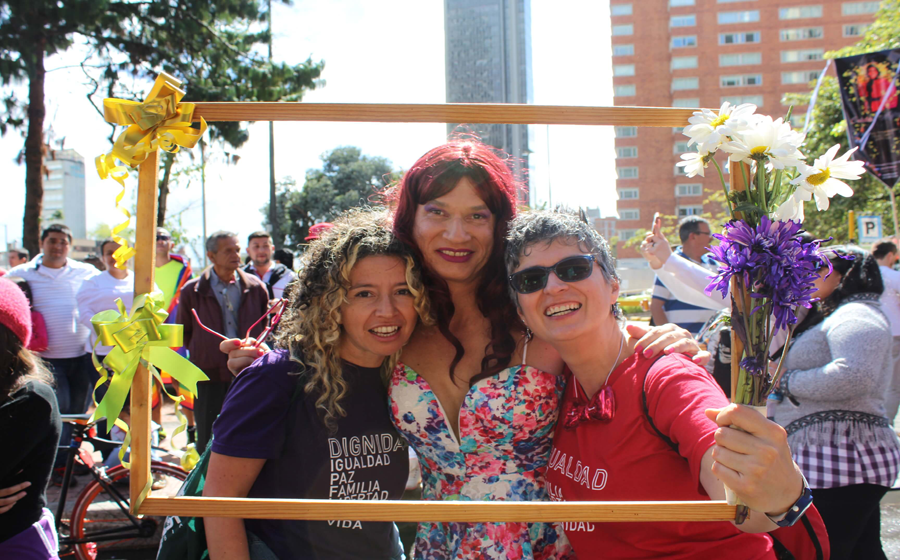
Founded in 2004, Colombia Diversa works for the equal inclusion of LGBT people in Colombia through legal advocacy, documentation of human rights violations, advocacy on national and international public policies and visibility. Colombia Diversa had a major victory in April 2016, when the Colombian Constitutional Court ruled in favor of marriage between same-sex couples. This victory represents more than 10 years of work in the long and difficult battle for the recognition of other rights of the same sex couples that lived in union, which was directed by Colombia Diversa and was supported by Astraea and five years of Direct work by marriage between same-sex couples. In 2011, the Constitutional Court stated that it gave Congress a period of two years to systematically regulate the rights of same-sex couples, if it did not, as of June 2013, couples could legally register their unions for Extend the matrimonial benefits received by heterosexual persons by then. Because this bill was never approved by Congress, as of 2013, activists in favor of same-sex marriage argued that because of the legal ambiguity of the Constitutional Court order, Sex could go to notaries or judges to get married. Colombia Diversa worked with progressive judges throughout the country, sometimes in secret, who were willing to marry same-sex couples. The conservative Attorney General of Colombia National prosecuted and prosecuted some of these couples and, in response, Colombia Diversa also filed suits on behalf of these couples. These lawsuits opened the legal path to bring back the case of equal marriage to the Constitutional Court that resulted in this recent victory. Colombia Diversa also visibly supported with legal arguments and social mobilization the different efforts that resulted in the complementary victory of the full adoption of rights for gay and lesbian couples in the Constitutional Court in November 2015.
*** En Español***
Fundada en 2004, Colombia Diversa trabaja por la inclusión igualitaria de las personas LGBT en Colombia a través de la defensoría legal, la documentación de los derechos humanos, la defensoría internacional y la visibilidad. Colombia Diversa tuvo una victoria importante en abril de 2016, cuando el Tribunal Constitucional colombiano falló a favor del matrimonio entre parejas del mismo sexo. Esta victoria representa más de 10 años de trabajo en la larga y difícil batalla por el reconocimiento de las relaciones de parejas del mismo sexo, la cual estuvo dirigida por Colombia Diversa y fue apoyada por Astraea, y de cinco años de trabajo directo por el matrimonio entre parejas del mismo sexo. En 2011, el Tribunal Constitucional ordenó que las parejas del mismo sexo podían registrar legalmente sus relaciones dentro de dos años en caso de que el Congreso no les extendiera los mismos beneficios matrimoniales que reciben las personas heterosexuales. Aunque este proyecto de ley no pasó en el Senado en 2013, lxs activistas a favor del matrimonio entre personas del mismo sexo argumentaron que, debido a la ambigüedad legal de la orden del Tribunal Constitucional, las parejas del mismo sexo podían acudir a notarios o a jueces para casarse. Colombia Diversa trabajó con jueces progresistas por todo el país, a veces en secreto, que estaban en disposición de casar a parejas del mismo sexo. El conservador Fiscal General de Colombia demandó a algunas de estas parejas y, en respuesta, Colombia Diversa también sometió demandas en nombre de estas parejas. Estas demandas legales abrieron el camino legal para traer de vuelta el caso al Tribunal Constitucional y, eventualmente, resultaron en esta reciente victoria. Colombia Diversa también encabezó los esfuerzos que resultaron en la victoria complementaria de la plena adopción de los derechos para las parejas gays y lesbianas en el Tribunal Constitucional en noviembre de 2015.











